 Petzlover
Petzlover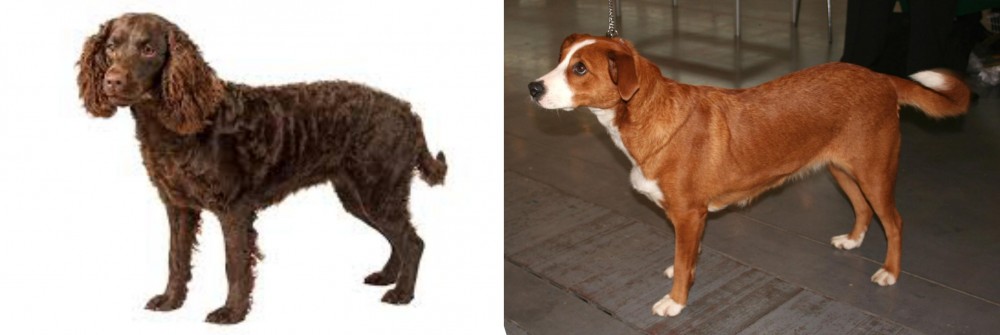 American Water Spaniel is originated from United States but Osterreichischer Kurzhaariger Pinscher is originated from Austria. Both American Water Spaniel and Osterreichischer Kurzhaariger Pinscher are having almost same height. Both American Water Spaniel and Osterreichischer Kurzhaariger Pinscher are of same weight. Both American Water Spaniel and Osterreichischer Kurzhaariger Pinscher has same life span. Both American Water Spaniel and Osterreichischer Kurzhaariger Pinscher has same litter size. Both American Water Spaniel and Osterreichischer Kurzhaariger Pinscher requires Moderate Maintenance.
American Water Spaniel is originated from United States but Osterreichischer Kurzhaariger Pinscher is originated from Austria. Both American Water Spaniel and Osterreichischer Kurzhaariger Pinscher are having almost same height. Both American Water Spaniel and Osterreichischer Kurzhaariger Pinscher are of same weight. Both American Water Spaniel and Osterreichischer Kurzhaariger Pinscher has same life span. Both American Water Spaniel and Osterreichischer Kurzhaariger Pinscher has same litter size. Both American Water Spaniel and Osterreichischer Kurzhaariger Pinscher requires Moderate Maintenance.
 The American Water Spaniel was developed in the United States. He is the state dog of Wisconsin and was developed there in the 19th century. The bloodlines of this spaniel are varied but certainly include the English Water Spaniel and the Irish Water Spaniel. Even though they are the state dog of Wisconsin they were almost extinct when Dr. Fred J. Pfeifer rescued the breed. The numbers had fallen after World War II because hunting was now a recreational sport and not needed to provide food for the family. He then started a breed club and wrote a breed standard, both of which were recognized by the United Kennel Club and the American Kennel Club.
When first developed the American Water Spaniel was known as the American Brown Spaniel. It was bred with a curly, thick coat so that it cold be sustained in Wisconsin winters and cold water. It was bred to hunt grouse, water fowl and prairie chickens as well as furry land animals. Pfeifer advertised his dogs for sale everywhere using a mailer that read: “, "The American Brown Spaniel is distinctively an American production. Hunters have known this type for years and it was through their efforts that this dog was propagated.... For years we have bred only selective stock, breeding for gameness, stability, courage, intelligence, and beauty. They are dogs to admire and trust under all conditions whether in the home circle or in the field with the outdoor man."[2]
The American Water Spaniel was developed in the United States. He is the state dog of Wisconsin and was developed there in the 19th century. The bloodlines of this spaniel are varied but certainly include the English Water Spaniel and the Irish Water Spaniel. Even though they are the state dog of Wisconsin they were almost extinct when Dr. Fred J. Pfeifer rescued the breed. The numbers had fallen after World War II because hunting was now a recreational sport and not needed to provide food for the family. He then started a breed club and wrote a breed standard, both of which were recognized by the United Kennel Club and the American Kennel Club.
When first developed the American Water Spaniel was known as the American Brown Spaniel. It was bred with a curly, thick coat so that it cold be sustained in Wisconsin winters and cold water. It was bred to hunt grouse, water fowl and prairie chickens as well as furry land animals. Pfeifer advertised his dogs for sale everywhere using a mailer that read: “, "The American Brown Spaniel is distinctively an American production. Hunters have known this type for years and it was through their efforts that this dog was propagated.... For years we have bred only selective stock, breeding for gameness, stability, courage, intelligence, and beauty. They are dogs to admire and trust under all conditions whether in the home circle or in the field with the outdoor man."[2]
In Wisconsin, around the wolf River and the Fox River, hunters were looking for a water dog that could also hunt on land. They needed a dog that could work a variety of fowl and game but who was small enough for a skiff and strong enough for the artic water temperatures of Wisconsin in the Winter. So, in addition to the spaniels named above, other breeds such as the Curly Coated Retriever, the Poodle, Native Indian dogs and the Sussex Spaniel were intermixed. When first developed the American Water Spaniel was known as the American Brown Spaniel. It was bred with a curly, thick coat so that it cold be sustained in Wisconsin winters and cold water. It was bred to hunt grouse, water fowl and prairie chickens as well as furry land animals. The American Water Spaniel was then itself used to develop another new breed, the Boykin Spaniel. In 1985 Wisconsin declared the American Water Spaniel to be the official state dog. Even so there remain only a few thousand dogs in existence. Though recognized by the AKC, they are neither spaniels nor retrievers and remain unclassified. Because of this they cannot compete in AKC field trials, but they do compete in AKC hunt tests. Though rare, the American Water Spaniel is a great hunting dog, retriever and companion.
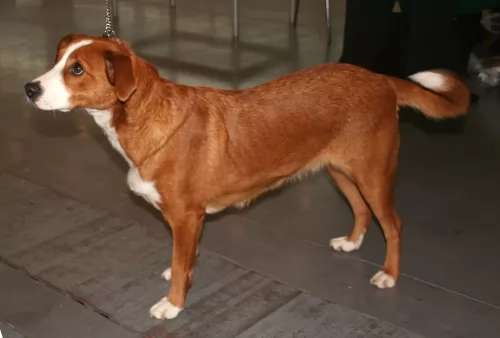 Hailing from Austria, the Osterreichischer Kurzhaariger Pinscher, better known as the Austrian Short-Haired Pinscher has always been depicted on paintings from the Baroque period.
Hailing from Austria, the Osterreichischer Kurzhaariger Pinscher, better known as the Austrian Short-Haired Pinscher has always been depicted on paintings from the Baroque period.
The dog is a terrier-type canine and has always been used as a watchdog but he was also used to hunt because of the terrier qualities he possesses.
This dog has always been used for working on farms. Breeding of this dog started in 1921 and the dog was recognized by the United Kennel Club in 2006.
 The American Water spaniel is a midsized, muscular dog. There is nothing flashy about his looks or his work performance. He is however a consistent, competent swimmer and hunter. His brown coat is wavy or tightly curled, waterproof and dense. His feet have thick pads and webbed toes. The AWS is intelligent, happy, and easy going. He is a very versatile hunting dog on land and in water. The breed has not changed much since it originated in the 19th century. They can be liver, chocolate or brown. The eyes should be the same as the color of the coat. They have broad skulls with wide, long ears and an undocked tail.
The American Water spaniel is a midsized, muscular dog. There is nothing flashy about his looks or his work performance. He is however a consistent, competent swimmer and hunter. His brown coat is wavy or tightly curled, waterproof and dense. His feet have thick pads and webbed toes. The AWS is intelligent, happy, and easy going. He is a very versatile hunting dog on land and in water. The breed has not changed much since it originated in the 19th century. They can be liver, chocolate or brown. The eyes should be the same as the color of the coat. They have broad skulls with wide, long ears and an undocked tail.
They have a square, medium sized muzzle and wide nose. They have a bite that is level or scissors. The legs of the muscular American Water Spaniel are medium in length and the tail is full, with a medium length, curved and feathered. The dewclaws might or might not be removed.
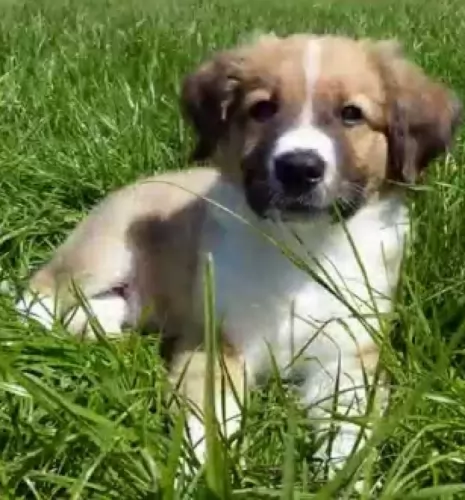 As a medium sized dog, both males and females stand at between 42 and 50cm in height and the dog weighs roughly between 14 and 20kg.
As a medium sized dog, both males and females stand at between 42 and 50cm in height and the dog weighs roughly between 14 and 20kg.
The coat is shortish, dense and smooth and is essentially black and tan with some white, fawn or brindle. The ears of the dog are fairly short and they look as though they wanted to be erect but then decided to be floppy. The nose is black and the eyes dark brown.
The tail is usually docked but when it is left long, it curls over the back. If you want your dog to be bred you can expect between 4 – 6 puppies.
These are playful dogs, getting on well with their human families and wanting to get involved in their activities. They are suspicious of strangers. They are good with kids, making them a good playmate, but they don’t like small children being allowed to climb over them.
They are able to get along well with any other pets in the house. It would be to your benefit to have the dog trained and socialized as he becomes obedient and good around people in social settings. He is an intelligent dog and will find training easy.
They also take their role as guardian and protector seriously.Because he was bred to be a farm dog, he wouldn’t e able to adapt to life on a tiny property in the city.
 Bred to work the American Water Spaniels are loyal to their people, want to please them, but are not so great with strangers. They are stubborn and love to be the center of attention. They are often one person or one family dogs. They need an owner who is the pack leader and willing to put in the time to train them. However, they are a versatile breed and need variety in training and activities rather than repetitive activities. They are prone to resource guarding, slow maturation and dominance. These negative traits are dissipated with a strong leader, good training and a lot of daily activity. They are sensitive as well as stubborn. Do not use a punishment-oriented training with them. They will respond out of love and loyalty or not at all. This is a breed that wants to be the alpha over the people and will do so if you let him. Keep them fenced as being hunters they love to wander and will leave home whenever they can.
Bred to work the American Water Spaniels are loyal to their people, want to please them, but are not so great with strangers. They are stubborn and love to be the center of attention. They are often one person or one family dogs. They need an owner who is the pack leader and willing to put in the time to train them. However, they are a versatile breed and need variety in training and activities rather than repetitive activities. They are prone to resource guarding, slow maturation and dominance. These negative traits are dissipated with a strong leader, good training and a lot of daily activity. They are sensitive as well as stubborn. Do not use a punishment-oriented training with them. They will respond out of love and loyalty or not at all. This is a breed that wants to be the alpha over the people and will do so if you let him. Keep them fenced as being hunters they love to wander and will leave home whenever they can.
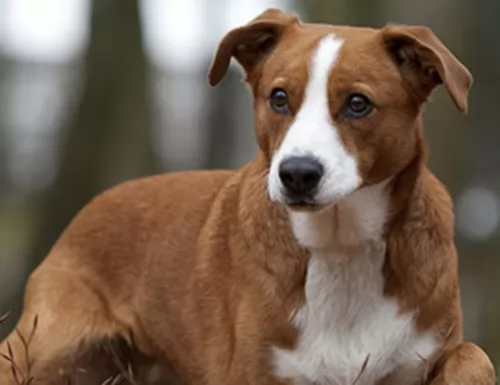 Have your Osterreichischer Kurzhaariger Pinscher trained and socialized if you want him to be amicable and obedient around you and your visitors.
Have your Osterreichischer Kurzhaariger Pinscher trained and socialized if you want him to be amicable and obedient around you and your visitors.
He does well with a human family who are firm, kind and patient with him. He loves to be kept busy with both mental and physical exercise, thriving on challenging activities, and he will become frustrated if he is left day after day just to lie around.
Take him with you on walks, buy him nice chewy, stimulating toys, throw a ball or frisbee with him and include him in your activities.
This is a dog more suited to life in the countryside as opposed to life in the city. Care well for this splendid family pet and you’ll quickly begin to see why dogs like him are known as man’s best friend.
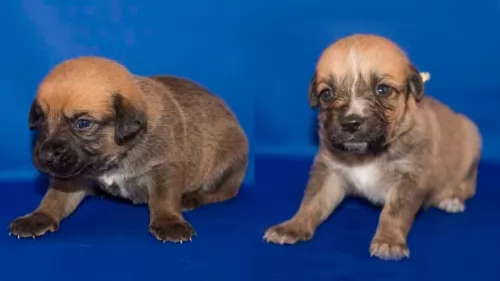 The Austrian Short-haired Pinscher is a robust kind of dog that isn’t going to have you rushing to the vet very often. True, he does have some hereditary health issues but it is highly unlikely that you will find these health issues in your pet.
The Austrian Short-haired Pinscher is a robust kind of dog that isn’t going to have you rushing to the vet very often. True, he does have some hereditary health issues but it is highly unlikely that you will find these health issues in your pet.
Nonetheless it pays to know about one of the more serious conditions -
This is a heart disease that is present from birth and could have been passed down from the parent dog to the puppy. A congenital heart defect occurs as a malformation of any valve, with the most common congenital heart diseases in dogs being patent ductus arteriosus, pulmonic stenosis as well as subaortic stenosis, all potentially inherited defects.
Sometimes a dog can live a fairly normal life with this disease but other times there are complications which can lead to congestive heart failure and atrial fibrillation, causing symptoms such as difficulty with breathing, cough and weakness. Your dog will need to get to the vet to discuss treatment options.
 Feeding the American Water Spaniel is no mystery. They need a high quality dry dog food with an eye toward calorie consumption. Some AWS have a tendency to become obese. Treats are important to the AWS in training but can add to the obesity concerns.
Feeding the American Water Spaniel is no mystery. They need a high quality dry dog food with an eye toward calorie consumption. Some AWS have a tendency to become obese. Treats are important to the AWS in training but can add to the obesity concerns.
Like other isolated breeds that were bred true, the genetic issues we see in many other popular breeds are not seen as much in the American Water Spaniel. They do however have a few issues to contend with.
Eyes: These issues appear to be inherited with progressive retinal atrophy and cataracts. Many AWS that develop cataracts do so at a very young age, usually under a year. Metabolic: Diabetes, hypothyroidism, glandular disorders and epilepsy. Baldness and Cardiac Issues. Orthopedic: Hip dysplasia. There is no evidence to suggest any elbow dysplasia. Additional concerns are hypothyroidism, allergies, epilepsy, diabetes and glandular disorders which Of course, the American Water Spaniel is an athlete who loves to be outdoors. He loves to swim, run and hunt. He needs daily exercise, or he can become loud and destructive. They thrive on having a job and they are not happy if they don’t have one. They are good at agility, obedience, dock diving and field trials. They also enjoy flyball and barn hunt.
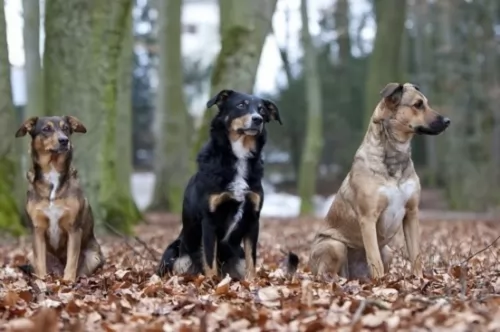 They need quite a lot of exercise, and even though they can adopt to life in the countryside or the city, they will require regular walks, ball- and rope games to prevent them becoming bored, frustrated and destructive.
They need quite a lot of exercise, and even though they can adopt to life in the countryside or the city, they will require regular walks, ball- and rope games to prevent them becoming bored, frustrated and destructive.
The Austrian Short-haired Pinscher sheds quite a bit so he will need to be brushed at least twice a week to remove the loose hairs.
As a medium sized, energetic dog, you want to ensure you maintain your dogs energetic nature by providing him with excellent food.
Choose your commercially manufactured food carefully as some of them are of a poor quality and can actually be detrimental to your dog’s health. Choose a high quality kibble that has quality ingredients.
Home-made food such as boiled chicken, brown rice or pasta and vegetables such as carrots, spinach and sweet potatoes all chopped up and added to his kibble occasionally will do wonders for this dog. He will thrive on also getting in some raw meat from time to time.
Ensure a constant supply of fresh, cool water.